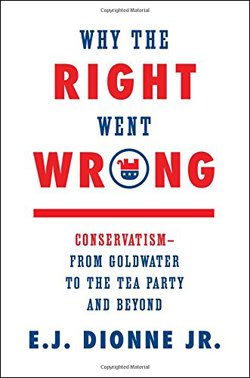A history of betrayal that leads to Donald Trump


Roula Khalaf, Editor of the FT, selects her favourite stories in this weekly newsletter.
During the 1996 election Bob Dole, the Republican nominee, and Barry Goldwater, an ill-fated predecessor, were overheard chatting. “You know, we’re the new liberals of the Republican party,” said Goldwater, chuckling. “Can you imagine that?”
Newt Gingrich, the man who, as Republican speaker, made them feel that way, might say the same about himself today. The revolution keeps devouring its children.
Donald Trump and Ted Cruz are the most radical frontrunners the party has seen. Some still understand “conservative” to mean defence of tradition by moderate means. For more than 50 years, however, US conservatism has looked more like Marxism in its tactics. “Extremism in defence of liberty is no vice,” said Goldwater.
He lost the 1964 election to Lyndon Johnson, who took 44 states. It was the most dramatic Republican setback of modern times, but he won the future of his party.
It is tempting to believe that today’s Tea Party is a departure but, writes EJ Dionne, it has existed in various forms since 1952. That was when war hero Dwight Eisenhower defeated Robert Taft, the Ohio conservative, for the Republican nomination. So began a “cycle of disappointment and betrayal” that has disrupted the party since.

The nomination was hijacked by “secret kingmakers” and “hidden persuaders”, said Phyllis Schlafly, whose 1964 book, A Choice Not an Echo, was a bestseller.
When Ike was president, the Republican party was still a party of New England. By 2010, it had largely retreated to the south. Today there are nine Republicans from the former Confederate states for every one from the north-east.
So what went wrong? The question itself might seem provocative. The fact that Dionne is an avowedly liberal columnist for The Washington Post would redouble suspicion. Yet it would be hard to find a more sympathetic non-conservative to attempt an answer. He has covered every election since the 1970s and is liked and trusted by Republicans and Democrats.
“George W Bush didn’t feel your pain,” he writes. “He let you in on the joke.” The upshot is a book perfectly timed for the 2016 contest, which kicks off in Iowa in just over a week. It is also an excellent primer.
With the exception of Ronald Reagan, US conservatism is addicted to pessimism, says Dionne. Conservatives have set themselves the impossible task of restoring America to a halcyon past that never existed. They are thus doomed to an endless dialectic of betrayal.
Mr Trump vows to “make America great again” — a word-for-word echo of Reagan’s mantra. He also invokes Richard Nixon’s “silent majority”. Yet by his own yardstick even Reagan was a failure.
“A government bureau is the nearest thing we will see on this earth to eternal life,” said Reagan. In 1980, when he was elected, US federal spending was 21.1 per cent of gross domestic product. Eight years later, when he stepped down, the figure was 21.0 per cent.
“Reagan changed the terms of the political debate without changing the underlying structure of federal government,” says Dionne.
Conservatives still see Reagan as the gold standard. They should examine his record more closely. He gave amnesty to millions of illegal immigrants, raised taxes to preserve Social Security, ignored the hawks to deal directly with Russian leader Mikhail Gorbachev and in the main avoided putting US boots on foreign soil. “Those sons of bitches won’t be happy until we have 25,000 troops in Managua,” he said of the cold warriors who wanted to invade Nicaragua.
True, he slashed taxes but he did all this by working with his opponents rather than deriding them. Contrast Reagan’s demeanour with that of Mr Trump, who calls opponents “losers” and “morons”. Yet both Mr Trump and Mr Cruz, who makes a virtue of being disliked by colleagues, are seen as Reagan’s heirs. The nonagenarian Ms Schlafly describes Mr Trump as “our best hope” to “defeat the kingmakers”.
Can anyone break the cycle? “Reagan stole optimism from [Franklin Roosevelt] and the Democrats and Bill Clinton stole it back,” says Dionne. His is a tempered book — suffused with the kind of moderation and balance he believes Republicans desperately need. Whether anyone heeds his advice is another matter.
The writer is the FT’s chief US columnist
Why the Right Went Wrong: Conservatism From Goldwater to the Tea Party and Beyond, by EJ Dionne, Simon & Schuster, RRP$30
Letter in response to this article:
Hayek’s objections to conservatism still apply / From Leonard S Hyman
Comments